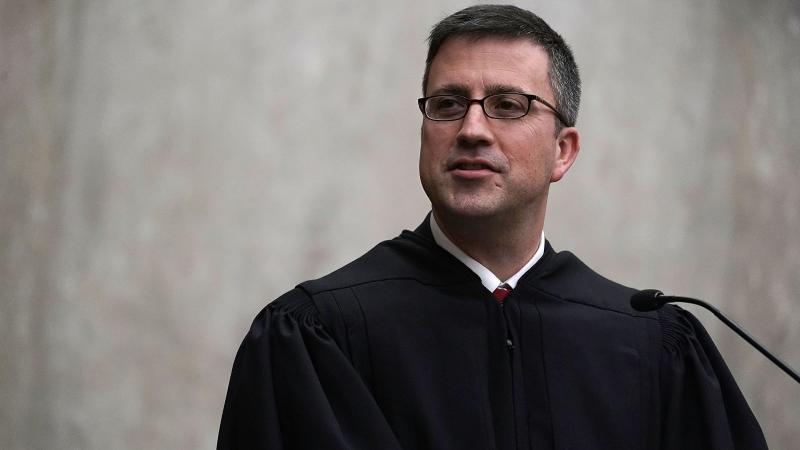Judge tosses House Dems' lawsuit over Trump's use of emergency military funds for border wall



Washington, D.C., district court Judge Trevor McFadden threw out House Democrats' lawsuit seeking an injunction against President Trump's emergency border wall funding reallocation, saying that the matter is fundamentally a political dispute and that the politicians lack standing to make a legal case.
Trump had declared a national emergency this past February over the humanitarian crisis at the southern border, following Congress' failure to fund his border wall legislatively. House Speaker Nancy Pelosi, D-Calif., and House Democrats then filed suit in April, charging that Trump was "stealing from appropriated funds” by moving $6.7 billion from other projects toward border wall construction.
But, in his ruling , McFadden, a Trump appointee, suggested Democrats were trying to circumvent the political process.
"This case presents a close question about the appropriate role of the Judiciary in resolving disputes between the other two branches of the Federal Government. To be clear, the court does not imply that Congress may never sue the Executive to protect its powers," McFadden wrote in his opinion . "The Court declines to take sides in this fight between the House and the President."
McFadden's ruling contrasted with Barack Obama-appointed U.S. District Court Judge Haywood Gilliam’s injunction last week , which blocked the administration from using the reallocated funds for projects in specific areas in Texas and Arizona.
McFadden began by focusing on two guiding Supreme Court cases he called "lodestars"-- the 2015 case Arizona State Legislature v. Arizona Independent Redistricting Commission, and the 1997 case Raines v. Byrd.
"Read together, Raines and Arizona State Legislature create a spectrum of sorts," McFadden wrote. "On one end, individual legislators lack standing to allege a generalized harm to Congress’s Article I power. On the other end, both chambers of a state legislature do have standing to challenge a nullification of their legislative authority brought about through a referendum."
But McFadden quickly distinguished the Arizona State Legislature case, which found institutional standing for legislators only in a limited instance. The Arizona case, the judge noted, “does not touch or concern the question whether Congress has standing to bring a suit against the President," and the Supreme Court has found there was “no federal analogue to Arizona’s initiative power."
Democrats' dispute was more similar to the one in the Raines case, McFadden wrote. Under the framework and factors considered in Raines -- including how similar matters have been handled historically, and the availability of other remedies besides litigation -- McFadden ruled House Democrats lacked standing.
Concerning past historical practice, the Trump administration argued in its brief that when Congress was concerned about "unauthorized Executive Branch spending in the aftermath of World War I, it responded not by threatening litigation, but by creating the General Accounting Office." The judge cited that argument the judge cited appprovingly in his opinion, calling it "persuasive."
Examples of hotly debated political questions being resolved without involving the courts, McFadden continued, "abound" throughout history.
For example, McFadden wrote, in 1933, President Franklin D. Roosevelt "fired an official from his Senate-confirmed position at the Federal Trade Commission. ...The President removed the official without providing a reason. ... The Senate likely had a 'strong[] claim of diminution of' its Advice and Consent power. ... Yet the Senate made no effort to challenge this action in court."
Additionally, McFadden said Democrats retained constitutional legislative options with which to remedy their objections about the president's purported misuse of the Appropriations Clause. Under Supreme Court precedent in the Raines case, McFadden asserted, the existence of those additional options suggested Democrats lacked standing.
McFadden noted in particular that Democrats retained the power to modify or even repeal the appropriations law if they wanted to "exempt future appropriations" from the Trump administration's reach.

This May 29, 2019 photo released by U.S. Customs and Border Protection (CBP) shows some of 1,036 migrants who crossed the U.S.-Mexico border in El Paso, Texas, the largest that the Border Patrol says it has ever encountered. Video shows them going under a chain-link fence to the U.S., where they waited for agents to come. The Border Patrol has encountered 180 groups of more than 100 people since October, compared to 13 during the previous 12-month period and two the year before. (U.S. Customs and Border Protection via AP)
Because the White House had not "nullified" that legislative power, McFadden wrote, there was no urgent need for judicial intervention sufficient to override the considerations of the political question doctrine, which holds that courts generally stay out of politically sensitive matters best left to voters.
"Congress has several political arrows in its quiver to counter perceived threats to its sphere of power," McFadden wrote. "These tools show that this lawsuit is not a last resort for the House. And this fact is also exemplified by the many other cases across the country challenging the administration's planned construction of the border wall."
McFadden continued: "The House retains the institutional tools necessary to remedy any harm caused to this power by the Administration’s actions. Its Members can, with a two-thirds majority, override the President’s veto of the resolution voiding the National Emergency Declaration. They did not. It can amend appropriations laws to expressly restrict the transfer or spending of funds for a border wall under Sections 284 and 2808. Indeed, it appears to be doing so."
The judge added that House Democrats had the burden of demonstrating that they had standing -- a difficult hurdle for any plaintiff to clear, which involves showing a particularized injury that the court can address.
To that end, McFadden quoted former Chief Justice John Marshall's opinion in the seminal 1803 case Marbury v. Madison, in which Marshall wrote, the "province of the [C[ourt is, solely, to decide on the rights of individuals, not to enquire how the executive, or executive officers, perform duties in which they have a discretion."
McFadden also wrote, quoting from another Supreme Court case, "Intervening in a contest between the House and President over the border wall would entangle the Court 'in a power contest nearly at the height of its political tension' and would 'risk damaging the public confidence that is vital to the functioning of the Judicial Branch.'"
Lawmakers expressly approved only $1.375 billion in the weeks after the shutdown, to go toward funding to 55 miles of wall along the southern border. But, Trump said that was inadequate, and he pushed ahead by moving funds from other Homeland Security projects previously approved by legislators. In his budget request earlier this year , Trump formally requested another $8.6 billion from Congress, saying that would be sufficient to build more than 700 miles of wall.
At a hearing in May, McFadden hinted that courts should stay out of the matter -- and suggested an appeal was imminent regardless.
"I’m not sure how much necessarily our views will carry the day for the courts above us," McFadden said at the hearing.
Disagreement is already brewing in the lower courts, setting the stage for appellate panels to step in. Gillam, the Northern District of California judge who ruled last month that Trump was likely breaking the law by reallocating the wall funds, blocked some projects slated for immediate construction in Yuma and El Paso.
“In short, the position that when Congress declines the Executive’s request to appropriate funds, the Executive nonetheless may simply find a way to spend those funds without Congress does not square with fundamental separation of powers principles dating back to the earliest days of our Republic,” wrote Gilliam.
By Gregg Re
 Article is LOCKED by author/seeder
Article is LOCKED by author/seeder
Who is online
65 visitors

"The judge added that House Democrats had the burden of demonstrating that they had standing -- a difficult hurdle for any plaintiff to clear, which involves showing a particularized injury that the court can address.
To that end, McFadden quoted former Chief Justice John Marshall's opinion in the seminal 1803 case Marbury v. Madison, in which Marshall wrote, the "province of the [C[ourt is, solely, to decide on the rights of individuals, not to enquire how the executive, or executive officers, perform duties in which they have a discretion."
Another Home Run for Donald J Trump
But there IS a "particularized injury" to the Democratic Party. They would lose all those intended registrants to support their Party's candidates.
LMAO!
The cartoon on another article about illegal immigrants, that shows Governor Brown saying "We support bridges" showing a bridge over the border with a road leading to a Democrat Registration Centre says it all.
saying that the matter is fundamentally a political dispute and that the politicians lack standing to make a legal case.
If the Dems can't make their case, they will try to go around the law, or run to the courts.
They need Justice Brennan back!
So who is supposed to decide a dispute if not the courts.
He said that if you want something changed, get a majority....
All that he did was pass the buck.
He passed the buck back to the Constitutionality of the actions being taken by the Dems/Libs. Until they meet the criteria of an injured party, they have absolutely no standing in suing the President over anything.
That will come on election day, when the Dems lose the House and the presidency races.
[Removed]
Day dreams again
The people. If the people want a certain outcome, they can vote in representatives who will change the law to their liking. If they are ok with things as they are, then the law won't change. Lazy legislators (sounds like a fun softball team) want a quick fix in the courts, rather than doing the work of compromise and negotiation with their fellow members.
So he's a Rump judge?
Yep, he is following the law.
The facts saying that the matter is fundamentally a political dispute and that the politicians lack standing to make a legal case.
That's a fair assessment
Good! Another case of judicial sanity prevails.
I kind of love seeing a judge who is willing to say "I am not here to solve all of your problems."
There's no doubt the Dems have 'Judge shopped' this case...just like they do all of their cases....they will continue until they find one that stops Trump. It has nothing to do with Boarder Protection, or an over-reach of the Executive Branch...it has everything to do with making sure this President isn't successful.
the judiciary is not on their side... a few nutjobs yes, but not the supreme court
bottom line is simple: the lunatic left will never stop this train.
when they get in the way, they just get run over/
cheers
Nothing but conjecture on your part
ya think? LOL
the fun part is every leftwing fail sets conservative precedent at the courts.
cheers